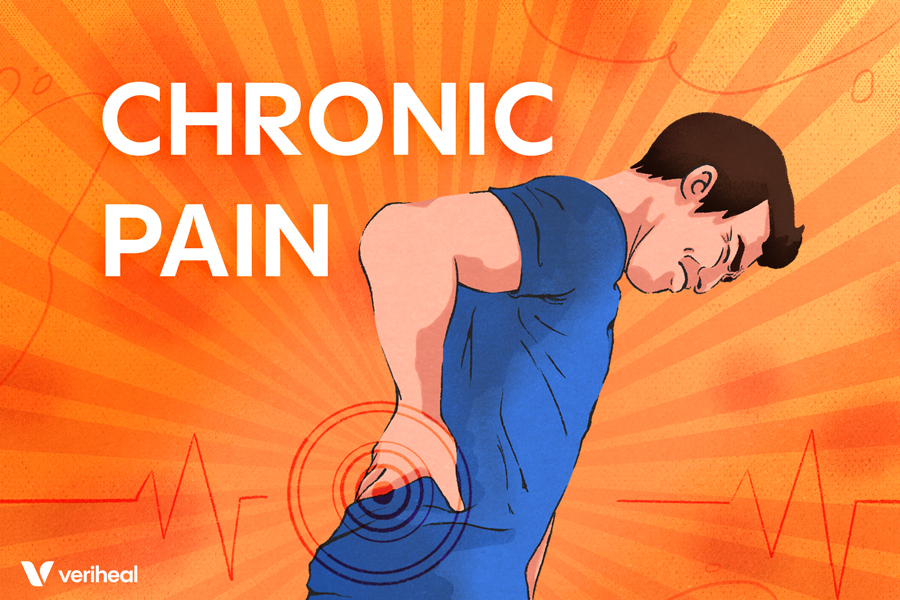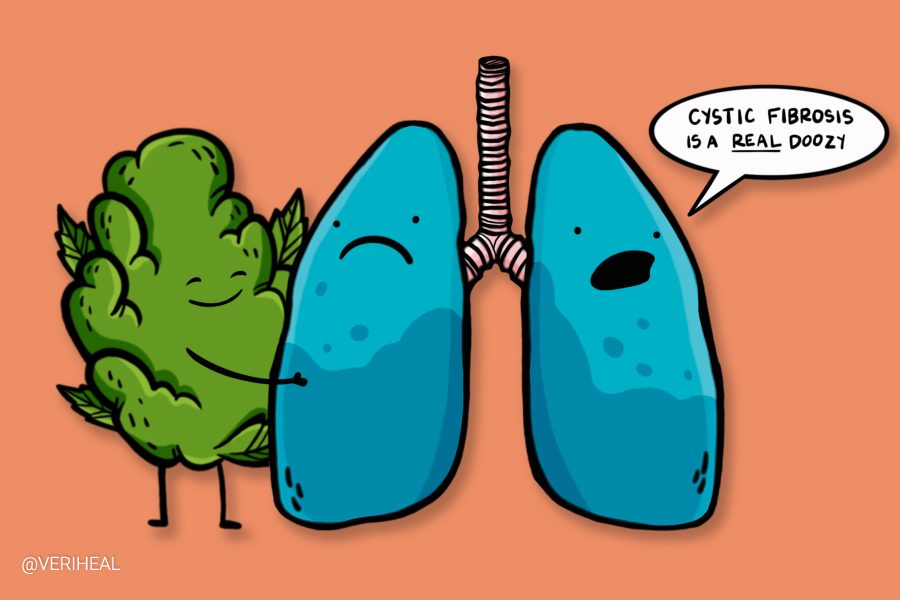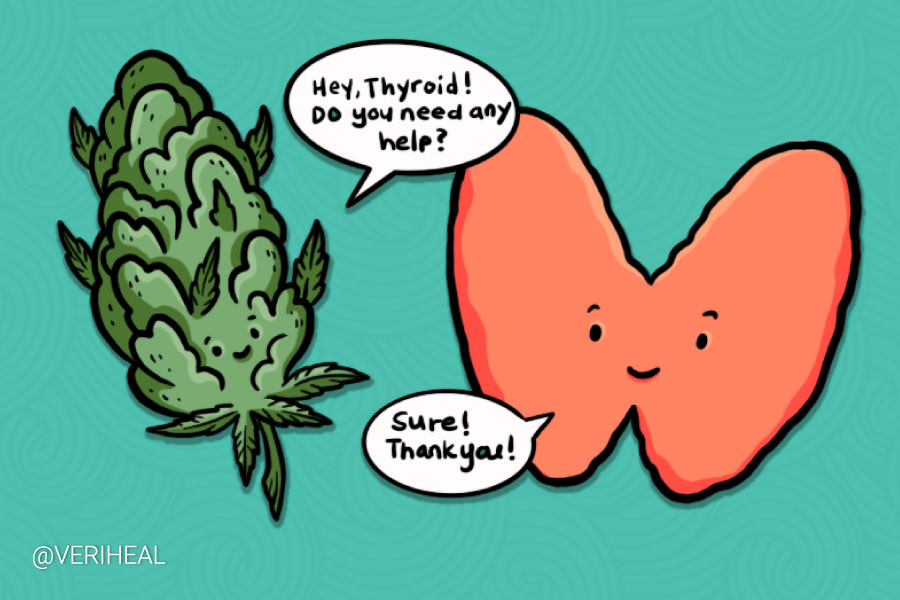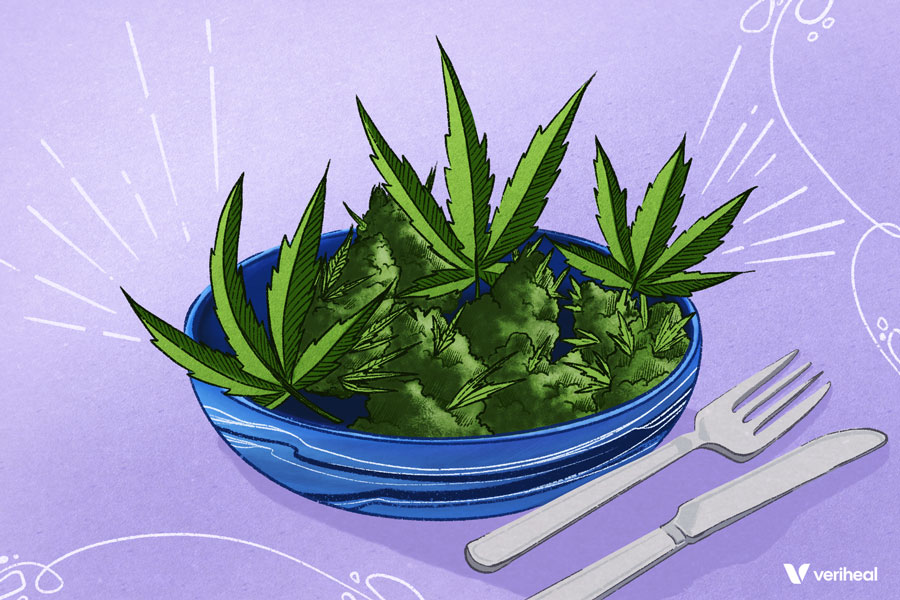Does Medical Cannabis Help Pancreatitis Pain?

Pancreatitis – or inflammation of the pancreas – occurs when digestive enzymes begin digesting the pancreas itself. If left untreated, both chronic and acute pancreatitis can lead to serious health complications.
Cannabis can be used to help combat the symptoms of pancreatitis–including inflammation and fibrosis. Read on for the science behind pancreatitis–from its causes to its treatments.
- What is Pancreatitis?
- Symptoms of Pancreatitis
- Causes of Pancreatitis
- What’s the Science Behind Using Cannabinoids for Pancreatitis?
- Can Cannabis Cause Pancreatitis?
- Pancreatic Cancer & Cannabis
- Discussing Pancreatitis with your Doctor
What is Pancreatitis?
Simply put, pancreatitis is inflammation of the pancreas. The pancreas becomes inflamed when digestive enzymes such as bile or stomach acid begin to digest the pancreas itself (28).
Sometimes this inflammation is acute, which suddenly occurs and lasts days. In other cases, pancreatitis can last much longer, qualifying as chronic pancreatitis. Compared to acute pancreatitis, the chronic condition can last years (13).
Pancreatitis is often considered more of a secondary rather than a primary disease. As such, other conditions may contribute to developing pancreatitis.
If you think your pancreas is inflamed, seek advice from medical professionals as soon as possible. These professionals may need to rule out other pancreatic diseases to find the best treatment for your case.
The pancreas is located behind the stomach and near the top part of the small intestine (1). It is also considered part of the digestive system, releasing digestive juices into the small intestine. The pancreas provides the necessary enzymes to break down carbs, fats, proteins, and stomach acids for nutrition and well-being (27).
The pancreas is also considered an endocrine gland, part of the bodily system that regulates hormones. It releases the hormones that regulate blood sugars, like glucagon, somatostatin, and insulin.
Diabetes occurs when the pancreas cannot produce enough insulin or the body cannot recognize the insulin produced by the pancreas.
Symptoms of Pancreatitis
One of the main symptoms of pancreatic inflammation is tender, upper abdominal pain near the bottom of the ribcage, which may radiate into the back (13).
Patients experiencing acute pancreatitis often feel and look ill, accompanied by systemic symptoms like fever, nausea, and vomiting (25)(16).
Please see below for more specific pancreatic symptoms.
Acute Pancreatitis Symptoms (13)
- Abdominal tenderness
- Fever
- Rapid heart rate
- Nausea and vomiting
- Shortness of breath (25)
- Jaundice, or yellowing of the skin (25)
Chronic Pancreatitis Symptoms
Chronic pancreatitis is acute pancreatitis that does not heal or improve (13). Unlike acute pancreatitis, chronic pancreatitis can sometimes be painless but accompanied by fatty stools and weight loss (16). Additionally, patients may also experience (13):
- Abdominal pain that feels worse after eating
- Losing weight without trying
- Oily, smelly bowel movements
- Diarrhea (25)
When experiencing these symptoms, seeing a doctor or visiting the emergency room is crucial, as severe upper abdominal pain is considered a medical emergency and needs immediate attention.
Causes of Pancreatitis
Sometimes medical professionals are unable to determine the cause of pancreatitis. However, the two most common causes of acute pancreatitis are gallstones (35-40%) and alcohol abuse (30%) (16).
Alcohol abuse is the most common cause of chronic pancreatitis. Alcohol use is directly toxic to the pancreas and unfavorably alters its immunology (16).
Another common cause of pancreatitis is cystic fibrosis. Other important risk factors for chronic pancreatitis include smoking, obesity, diabetes, family history, and high triglycerides (13).
The pancreas can also become irritated by gallstones in the pancreatic duct. When the gallbladder – located next to the pancreas – passes stones, the gallstone can get stuck in the pancreatic duct. Trapped gallstones cause an acute buildup of self-digesting enzymes and inflammation. This build-up causes the gallbladder to push against the pancreas and causes further irritation.
Other commonly identifiable causes of pancreatic inflammation include (25):
- Genetic conditions, such as cystic fibrosis
- High levels of lipids or fat in the blood
- High blood calcium levels
- Endoscopic Retrograde Cholangiopancreatography (ERCP) or other surgical procedure
- Certain medications, including (16)
- Immunosuppressants including azathioprine
- Chemotherapy drugs like 6- mercaptopurine
- HIV/AIDS drug didanosine
- Anti-seizure medications like valproic acid
- Common blood pressure drugs like angiotensin-converting-enzyme (ACE) inhibitors
- Anti-inflammatory mesalamine, often used in inflammatory bowel disease
Untreated pancreatitis may lead to serious health problems, including pancreatic cancer, kidney failure, diabetes, infection, and breathing issues (13).
What’s the Science Behind Using Cannabinoids for Pancreatitis?
Several studies detail the effect of cannabis on the body and the pancreas specifically.
Cannabis begins its work in the body after coming in contact with cannabinoid receptors CB1 and CB2, among many other anti-inflammatory and pain receptors (e.g., COX-2, PPAR, TRP, GPR55). Cannabinoids also work directly with endocannabinoid-regulating enzymes such as FAAH and MAGL. These receptors and enzymes affect the levels and activities of endocannabinoids or fat-based neurotransmitters in the brain and body.
Cannabinoids are natural compounds found in cannabis, including Δ9-tetrahydrocannabinol (THC) and cannabidiol (CBD). THC and CBD interact with cannabinoid receptors in the body.
CB1 receptors are thought to play a role in our perception of pain in the body, including the pancreas (15). Please check out our chronic pain page for more information about how cannabinoids help adjust pain perception.
A 2008 study published in PLoS found that cannabinoids can play a positive role in acute pancreatitis patients and pancreatic cancer patients. The study looked at pancreatic stellate cells, which are responsible for cell regulation through a process called extracellular matrix (ECM) production (9).
These cells are generally dormant, but in cases of pancreatitis, they exhibit changes due to inflammation (14). Chronic inflammation of these cells can lead to fibrosis, increasing the risk of developing pancreatic cancer.
When researchers activated the CB1 and CB2 receptors on these cells, inflammation and fibrosis decreased. This evidence suggests that the endocannabinoid system is a potential therapeutic target for pancreatitis and pancreatic cancer.
As such, cannabis may be useful in reducing the prevalence of negative symptoms of chronic and acute pancreatitis.
Can Cannabis Cause Pancreatitis?
There is some debate in the medical community about acute pancreatitis in cannabis users. Few studies suggest a strong correlation between heavy cannabis use and pancreatitis.
A 2018 study examining if there is an effect between cannabis consumption and acute pancreatitis concluded that cannabis use does not independently affect the severity or mortality of the condition (23). The authors of this case report examined 460 cases of idiopathic pancreatitis. Idiopathic pancreatitis simply means that doctors are unable to determine the cause definitively.
Cases of cannabis-induced acute pancreatitis only made up about 10% or 48 of the cases studied (23). It also found that in only 9 cases, cannabis was associated with idiopathic acute pancreatitis. However, since correlation is not the same as causation, the authors could only conclude that cannabis-induced acute pancreatitis was associated with approximately 2% of all the cases analyzed.
Pancreatic Cancer & Cannabis
The vast majority of research regarding how the use of cannabis affects the pancreas is focused on pancreatic cancer, the most dangerous complication of chronic pancreatitis (16).
Pancreatic cancer is a type of cancer that begins in the pancreas and is difficult to diagnose because symptoms and pain do not typically occur until the cancer is in later stages (18). The most common type of cancer of the pancreas is pancreatic ductal cancer (PDC). This cancer forms within the ducts of the pancreas where digestive enzymes are stored and released.
Cancer treatment is a very well-researched and supported area for the therapeutic use of cannabinoids (32). Cannabis may help with symptomatic relief such as chronic pain, cachexia, and nausea and vomiting related to traditional cancer treatments. It has also been shown to decrease tumor growth in certain types of cancer. Please check out our cancer page for more information.
A study published in 2008 measured CB1 and CB2 receptors in healthy and cancerous pancreatic tissues (15). This study also looked at levels of fatty acid amide hydrolase (FAAH) and monoacylglycerol lipase (MGLL). These are two enzymes that are responsible for metabolizing endocannabinoids.
Researchers found that samples with lower levels of CB1 receptors in the nerves are associated with stronger pain symptoms (15). This association makes sense as CB1 receptors are a typical medical cannabis target for relieving pain. An increase in the activation of these receptors is a novel clinical pathway for treating pancreatic pain, as it is associated with less severe pain in this study.
In addition to the general benefits of cannabinoid use during cancer, research supports that CB1 and CB2 cells of the pancreas may be a strong target for treating pancreatic cancer (14).
Cannabinoids also interact and influence a variety of proteins and enzymes in the body. 2018 research in mice indicates that the G-coupled protein receptor GPR55 warrants further clinical studies in humans regarding pancreatic cancer and cannabinoid use (7). Researchers found that CBD and gemcitabine, a common drug for treating PDC, are able to inhibit tumor growth by antagonizing the GPR55 pathway.
Discussing Pancreatitis with your Doctor
If you are experiencing upper abdominal pain, it is extremely important to see your healthcare provider right away or go to a local emergency room. Upper abdominal pain is considered a medical emergency. You will undergo bloodwork and possibly imaging such as a CT scan or MRI/MRCP (16). Clinicians can see what is going on with your pancreas, gallbladder, and liver. You may be required to stay in the hospital for a few days where you will be given IV fluids and pain medications (33).
Depending on the cause of pancreatitis, you may need surgery to drain fluids or remove pancreatic tissues that are damaged (33). You may also need to have your gallbladder removed if gallbladder stones are causing your pancreatitis.
In patients with chronic pancreatitis, treatment involves pain control, counseling regarding smoking, alcohol cessation, pancreatic enzyme replacement, and a low-fat diet (16).
It is important to let your doctors know about any medications you are taking, alcohol, smoking, and drug use – including medical cannabis – to avoid undesirable side effects. In a small number of cases of pancreatitis, it may be related to heavy cannabis use.
Note: Veriheal does not intend to give this as professional medical advice. Do not attempt to self-diagnose or prescribe treatment based on the information provided on this page. Always consult a physician before making any decision on the treatment of a medical condition.
This article was originally published on July 15, 2020. The content was most recently updated on April 26, 2023.
1. Barkin, J. A., Nemeth, Z., Saluja, A. K., & Barkin, J. S. (2017). Cannabis-Induced Acute Pancreatitis: A Systematic Review. Pancreas, 46(8), 1035–1038. https://pubmed.ncbi.nlm.nih.gov/28796137/
2. Dando, I., Donadelli, M., Costanzo, C., Dalla Pozza, E., D’Alessandro, A., Zolla, L., & Palmieri, M. (2013). Cannabinoids inhibit energetic metabolism and induce AMPK-dependent autophagy in pancreatic cancer cells. Cell death & disease, 4(6), e664. https://www.ncbi.nlm.nih.gov/pmc/articles/PMC3698539/
3. Dariš, B., Tancer Verboten, M., Knez, Ž., & Ferk, P. (2019). Cannabinoids in cancer treatment: Therapeutic potential and legislation. Bosnian journal of basic medical sciences, 19(1), 14–23. https://www.ncbi.nlm.nih.gov/pmc/articles/PMC6387667/
4. Dhar, P., Kalghatgi, S., & Saraf, V. (2015). Pancreatic cancer in chronic pancreatitis. Indian journal of surgical oncology, 6(1), 57–62. https://www.ncbi.nlm.nih.gov/pmc/articles/PMC4412870/
5. Donadelli, M., Dando, I., Zaniboni, T., Costanzo, C., Dalla Pozza, E., Scupoli, M. T., Scarpa, A., Zappavigna, S., Marra, M., Abbruzzese, A., Bifulco, M., Caraglia, M., & Palmieri, M. (2011). Gemcitabine/cannabinoid combination triggers autophagy in pancreatic cancer cells through a ROS-mediated mechanism. Cell death & disease, 2(4), e152. https://www.ncbi.nlm.nih.gov/pmc/articles/PMC3122066/
6. Fellermeier, M., Eisenreich, W., Bacher, A., & Zenk, M. H. (2001). Biosynthesis of cannabinoids. European Journal of Biochemistry, 268(6), 1596–1604. https://febs.onlinelibrary.wiley.com/doi/full/10.1046/j.1432-1327.2001.02030.x?sid=nlm%3Apubmed
7. Ferro, R., Adamska, A., Lattanzio, R., Mavrommati, I., Edling, C. E., Arifin, S. A., Fyffe, C. A., Sala, G., Sacchetto, L., Chiorino, G., De Laurenzi, V., Piantelli, M., Sansom, O. J., Maffucci, T., & Falasca, M. (2018). GPR55 signalling promotes proliferation of pancreatic cancer cells and tumour growth in mice, and its inhibition increases effects of gemcitabine. Oncogene, 37(49), 6368–6382. https://pubmed.ncbi.nlm.nih.gov/30061636/
8. Fogli, S., Nieri, P., Chicca, A., Adinolfi, B., Mariotti, V., Iacopetti, P., Breschi, M. C., & Pellegrini, S. (2006). Cannabinoid derivatives induce cell death in pancreatic mia paca-2 cells via a receptor-independent mechanism. FEBS Letters, 580(7), 1733–1739. https://febs.onlinelibrary.wiley.com/doi/10.1016/j.febslet.2006.02.024
9. Jin, G., Hong, W., Guo, Y., Bai, Y., & Chen, B. (2020). Molecular Mechanism of Pancreatic Stellate Cells Activation in Chronic Pancreatitis and Pancreatic Cancer. Journal of Cancer, 11(6), 1505–1515. https://www.ncbi.nlm.nih.gov/pmc/articles/PMC6995390/
10. Leyva-Illades, D., & Demorrow, S. (2013). Orphan G protein receptor GPR55 as an emerging target in cancer therapy and management. Cancer management and research, 5, 147–155. https://www.ncbi.nlm.nih.gov/pmc/articles/PMC3706254/
11. Lubega, F., & Lwanga, A. (2021). An Unexpected Case of Cannabis-Induced Pancreatitis. Cureus, 13(2), e13253. https://www.ncbi.nlm.nih.gov/pmc/articles/PMC7953271/
12. Maida, V., & Daeninck, P. J. (2016). A user’s guide to cannabinoid therapies in oncology. Current oncology (Toronto, Ont.), 23(6), 398–406. https://www.ncbi.nlm.nih.gov/pmc/articles/PMC5176373/
13. Mayo Foundation for Medical Education and Research. (2021, September 24). Pancreatitis. Mayo Clinic. Retrieved February 1, 2023, from https://www.mayoclinic.org/diseases-conditions/pancreatitis/symptoms-causes/syc-20360227#
14. Michalski, C. W., Maier, M., Erkan, M., Sauliunaite, D., Bergmann, F., Pacher, P., Batkai, S., Giese, N. A., Giese, T., Friess, H., & Kleeff, J. (2008). Cannabinoids reduce markers of inflammation and fibrosis in pancreatic stellate cells. PloS one, 3(2), e1701. https://www.ncbi.nlm.nih.gov/pmc/articles/PMC2253501/
15. Michalski, C. W., Oti, F. E., Erkan, M., Sauliunaite, D., Bergmann, F., Pacher, P., Batkai, S., Müller, M. W., Giese, N. A., Friess, H., & Kleeff, J. (2008). Cannabinoids in pancreatic cancer: correlation with survival and pain. International journal of cancer, 122(4), 742–750.https://www.ncbi.nlm.nih.gov/pmc/articles/PMC2225529/
16. Mohy-ud-din, N., & Morrissey, S. (2022). Pancreatitis. In StatPearls. StatPearls Publishing. http://www.ncbi.nlm.nih.gov/books/NBK538337/
17. Ngwa, W., Irabor, O. C., Schoenfeld, J. D., Hesser, J., Demaria, S., & Formenti, S. C. (2018). Using immunotherapy to boost the abscopal effect. Nature reviews. Cancer, 18(5), 313–322. https://www.ncbi.nlm.nih.gov/pmc/articles/PMC5912991/
18. Pancreatic cancer—Symptoms and causes—Mayo Clinic. (n.d.). Retrieved March 13, 2023, from https://www.mayoclinic.org/diseases-conditions/pancreatic-cancer/symptoms-causes/syc-20355421
19. Pancreatitis—NIDDK. (n.d.). National Institute of Diabetes and Digestive and Kidney Diseases. Retrieved March 13, 2023, from https://www.niddk.nih.gov/health-information/digestive-diseases/pancreatitis
20. Phillips, P. A., McCarroll, J. A., Park, S., Wu, M. J., Pirola, R., Korsten, M., Wilson, J. S., & Apte, M. V. (2003). Rat pancreatic stellate cells secrete matrix metalloproteinases: implications for extracellular matrix turnover. Gut, 52(2), 275–282. https://www.ncbi.nlm.nih.gov/pmc/articles/PMC1774949/
21. Sarfaraz, S., Adhami, V. M., Syed, D. N., Afaq, F., & Mukhtar, H. (2008). Cannabinoids for cancer treatment: Progress and promise. Cancer Research, 68(2), 339–342. https://aacrjournals.org/cancerres/article/68/2/339/541198/Cannabinoids-for-Cancer-Treatment-Progress-and
22. Sharafi, G., He, H., & Nikfarjam, M. (2019). Potential use of cannabinoids for the treatment of pancreatic cancer. Journal of Pancreatic Cancer, 5(1), 1–7. https://www.liebertpub.com/doi/full/10.1089/pancan.2018.0019
23. Simons-Linares, C. R., Barkin, J. A., Wang, Y., Jaiswal, P., Trick, W., Bartel, M. J., & Barkin, J. S. (2018). Is There an Effect of Cannabis Consumption on Acute Pancreatitis?. Digestive diseases and sciences, 63(10), 2786–2791. https://pubmed.ncbi.nlm.nih.gov/29922897/
24. Song, D., Geetha, H. S., Jain, S., Reyes, J. V., Jaiswal, V., Nepal, G., & Lieber, J. (2022). Delayed presentation of cannabis-induced pancreatitis. Clinical Case Reports, 10(3). https://onlinelibrary.wiley.com/doi/10.1002/ccr3.5595?af=R
25. Symptoms & Causes of Pancreatitis—NIDDK. (n.d.). National Institute of Diabetes and Digestive and Kidney Diseases. Retrieved March 13, 2023, from https://www.niddk.nih.gov/health-information/digestive-diseases/pancreatitis/symptoms-causes
26. Szurnicki, Pawel MD1; Alansari, Ahmed MD2; Alansari, Tarek MD2; Khan, Gulam MD3. Cannabis as an Overlooked Cause of Acute Pancreatitis: A Case Report and Literature Review: 1383. American Journal of Gastroenterology 113():p S794, October 2018. https://journals.lww.com/ajg/fulltext/2018/10001/cannabis_as_an_overlooked_cause_of_acute.1383.aspx
27. The Pancreas. (2020, July 20). https://www.hopkinsmedicine.org/health/conditions-and-diseases/the-pancreas
28. U.S. National Library of Medicine. (n.d.). Pancreatitis. MedlinePlus. Retrieved February 1, 2023, from https://medlineplus.gov/pancreatitis.html
29. U.S. National Library of Medicine. (n.d.). Pancreatic disorders. MedlinePlus. Retrieved February 1, 2023, from https://medlineplus.gov/pancreaticdiseases.html
30. Wilson, J. S., Pirola, R. C., & Apte, M. V. (2014). Stars and stripes in pancreatic cancer: Role of stellate cells and stroma in cancer progression. Frontiers in Physiology, 5. https://www.frontiersin.org/articles/10.3389/fphys.2014.00052/full
31. Xie, D., & Xie, K. (2015). Pancreatic cancer stromal biology and therapy. Genes & diseases, 2(2), 133–143. https://www.ncbi.nlm.nih.gov/pmc/articles/PMC4476547/
32. Marijuana and Cancer. (n.d.). Retrieved March 13, 2023, from https://www.cancer.org/treatment/treatments-and-side-effects/treatment-types/complemntary-and-integrative-medicine/marijuana-and-cancer.html
33. Mayo Foundation for Medical Education and Research. (2021, September 24). Pancreatitis. Mayo Clinic. Retrieved March 13, 2023, from https://www.mayoclinic.org/diseases-conditions/pancreatitis/diagnosis-treatment/drc-20360233

















